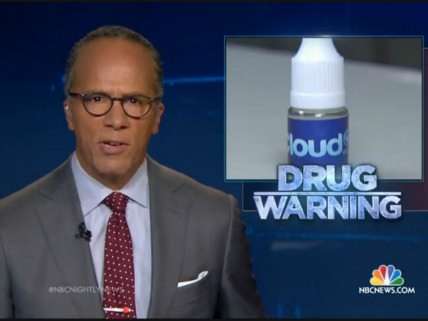The Mystery of Cloud 9: How Drug Laws Make Drugs More Dangerous

Have you heard about Cloud 9, the terrifying new synthetic drug sweeping the country? As I explain in my latest Forbes column, trying to pin down exactly what Cloud 9 is provides a lesson in the perverse effects of drug prohibition. Here is how the piece starts:
This week NBC News broadcast a story about Cloud 9, "a dangerous new synthetic drug that's been turning up at high schools." Anchorman Lester Holt warned that Cloud 9 is "legal, unregulated and readily available at convenience stores"; that it "has sent almost two dozen young people to the hospital this year in Michigan alone"; and that "it has already prompted one county to issue an emergency order banning its sale as an imminent danger to public health." In the report that followed Holt's introduction, correspondent John Yang described Cloud 9 as "a clear liquid" with "no aroma other than a faint fruity smell" that can be discreetly consumed in an e-cigarette and "cannot be detected by standard drug tests." According to Yang, the drug's effects "include hallucinations, agitation and severe vomiting," as well as "seizures, strokes and heart attacks."
Cloud 9 seems carefully designed to be every parent's nightmare and every yellow journalist's dream. But what is it, exactly, and what are its effects, aside from the hallucinations, agitation, severe vomiting, seizures, strokes, and heart attacks mentioned by Yang, which presumably are not what attracts people to it? NBC was vague on those points, and so is the local press coverage from which it cribbed much of its story. It turns out that lots of people think you should worry about Cloud 9, but very few of them know what it is.


Show Comments (15)